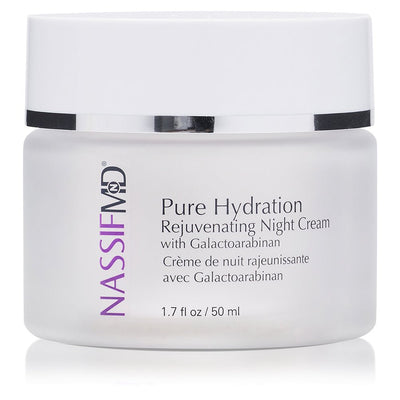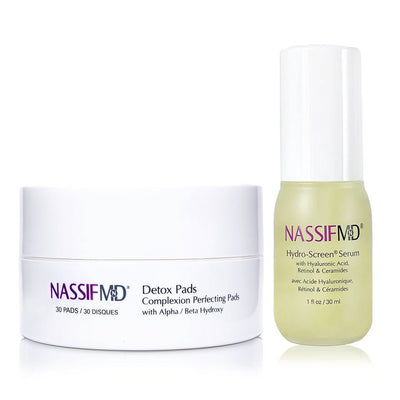What is Trans-Epidermal Water Loss? The Hidden Reason Your Skin Feels Tight
Typically, you don’t desire water retention in the legs, belly, or other areas that cause puffiness and bloating. However, you want water retention in the skin. More water in the skin indicates that the skin is hydrated, resulting in healthy, plump skin with fewer lines, wrinkles, and other signs of aging.
The primary molecule in your body is water, and a hydrated body works and feels better; the same is true for your skin.
A key predictor of skin hydration is trans-epidermal water loss (TEWL), which is the focus of today’s article. Keep reading as we discover:
-
What is trans-epidermal water loss? TEWL meaning
-
Why does my skin feel tight?
-
How to prevent trans-epidermal water loss
-
Signs and symptoms of TEWL in the skin
-
Skincare products from NassifMD® facial plastic surgeon skincare to nourish the skin barrier and prevent TEWL
What is Trans-Epidermal Water Loss?
What is TEWL? TEWL, or trans-epidermal water loss, describes the process where water evaporates from the skin’s surface. More formally, it’s a measurement of the amount of water lost via the skin.
The top layer of the skin, known as the stratum corneum or skin barrier, serves as a protective shield for the skin and body. Not only does it keep harmful substances, like toxins and pathogens, out, but it’s also designed to keep water in.
TEWL directly reflects the integrity of the skin barrier. An intact, healthy skin barrier protects the skin and body from water loss, holding water in the skin. On the other hand, a compromised or damaged skin barrier allows for increased water loss, leading to dry, dehydrated skin.
Why Your Skin Feels Tight
When your skin feels tight, the most obvious reason is that it’s dry and dehydrated. Dehydrated skin will pull, crease, and wrinkle, whereas hydrated skin feels plump and elastic. Skin dehydration often stems from a compromised or damaged skin barrier, which allows for increased trans-epidermal water loss. It also makes it more challenging to restore and maintain skin hydration because you must address the barrier.
Other factors that contribute to trans-epidermal water loss and tight feeling skin include:
-
Genetics
-
Aging
-
Stress
-
Inflammation
-
Dry climate or indoor environment
-
Harsh and low-quality skincare products
How to Prevent Water Loss
Reducing TEWL from the skin is about supporting the skin barrier. It means preventing the skin barrier damage that leads to water loss, while nourishing the skin barrier to maintain its health and integrity.
Here are some steps to take to protect the skin barrier and prevent water loss:
-
Prevent sun damage – Wear sunscreen daily and cover up to avoid burning and excessive sun exposure.
-
Eat a nutritious diet – The skin requires many nutrients to maintain its integrity, including collagen and other proteins, healthy fats, vitamins, and minerals. A nutritious diet and drinking enough water also provide hydration to the skin from the inside out.
-
Reduce exposure to pollution – Toxins and pollution can damage the skin barrier. Reduce them by filtering indoor air, choosing clean products in your home, and avoiding toxins in personal care products. Please note, NassifMD® Skincare is free of phthalates, lanolin, formaldehyde, parabens, and other damaging ingredients.
-
Adopt a healthy lifestyle – Managing stress, sleeping well, quitting smoking, engaging in regular exercise, and other health-oriented behaviors support healthy skin.
-
Use barrier-friendly skincare products – The entire NassifMD® Skincare line is designed to nourish, hydrate, and protect the delicate skin barrier.
-
Use gentle cleansers and exfoliate – Cleanse and exfoliate to remove dirt, debris, and dead skin cells, allowing hydrating skincare ingredients to penetrate and work more effectively.
-
Use hydrating serums and moisturizers – Choose specific products to hydrate the skin and support healthy skin barrier function. Continue reading to discover our recommended products.
TEWL Signs and Skin Symptoms
Poor skin barrier health and increased water loss are often present as dry, dehydrated skin. Here are some signs and symptoms to be aware of:
-
Tightness
-
Flakiness or peeling
-
Irritation
-
Itchiness
-
Redness
-
Inflammation
-
Cracking
-
Dullness
-
Increased sensitivity
-
Poor wound healing
-
Exacerbation of previous symptoms or conditions
Best Products for Water Retention
When it comes to the skin, we don’t want to ask how to get rid of water retention. Instead, we want to heal, nourish, and protect the delicate skin barrier to retain water more effectively. This approach helps transform dry, tight skin into plump, hydrated, healthy-looking skin.
Here are the products Dr. Nassif recommends to promote such a transformation:
NassifMD® 3HA Hydrating Facial Mist
Use this facial mist as a toner, after cleansing and before serums, or anytime your skin feels tight and needs a refresh.
NassifMD® Hydro-Screen Serum
Apply serums twice daily after cleansing and toning. Hydro-Screen can also be mixed into your moisturizer or used as the last step of your routine before makeup as a primer.
NassifMD® Pro Peptide Collagen Serum
Use this facial serum twice daily after cleansing and toning. You can layer it with Hydro-Screen for additional benefits.
NassifMD® Soft Focus Hydrating Day Cream
Use this day cream each morning at the end of your skincare routine, but before sunscreen and makeup.
NassifMD® Skin Barrier Protection Cream
NassifMD® Skin Barrier Protection Cream, as the name states, this moisturizer targets the skin barrier to prevent trans-epidermal water loss. With botanical ingredients, niacinamide, sunflower oil, and natural saccharides, it calms, heals, and comforts the skin.
This moisturizer can be applied twice daily (morning and night), after cleansing, toning, and serums. Additionally, apply as needed to soothe dry, irritated, and tight skin.
NassifMD® Pure Hydration Night Cream
NassifMD® Pure Hydration Night Cream is another moisturizer option, specifically designed for nighttime use to hydrate and nourish the skin barrier while you sleep. With galactoarabinan (natural polysaccharides from Larch), vitamin C, and aloe, this formula has a thick, rich texture and promotes natural skin regeneration.
Use it in the evening as the last step in your skincare routine before sleep.
When your skin feels tight, it’s a message from your skin barrier that it needs some love. Skin hydration depends on a healthy, intact, and well-functioning skin barrier. While many habits and environmental factors can disrupt the skin barrier, you can restore it with a targeted skincare routine from NassifMD® facial plastic surgeon skincare.
References
-
Green, M., Kashetsky, N., Feschuk, A., & Maibach, H. I. (2022). Transepidermal water loss (TEWL): Environment and pollution-A systematic review. Skin health and disease, 2(2), e104.
-
Juncan, A. M., Moisă, D. G., Santini, A., Morgovan, C., Rus, L. L., Vonica-Țincu, A. L., & Loghin, F. (2021). Advantages of Hyaluronic Acid and Its Combination with Other Bioactive Ingredients in Cosmeceuticals. Molecules (Basel, Switzerland), 26(15), 4429.
-
Suzuki, M., Ohno, Y., & Kihara, A. (2022). Whole picture of human stratum corneum ceramides, including the chain-length diversity of long-chain bases. Journal of lipid research, 63(7), 100235.






















